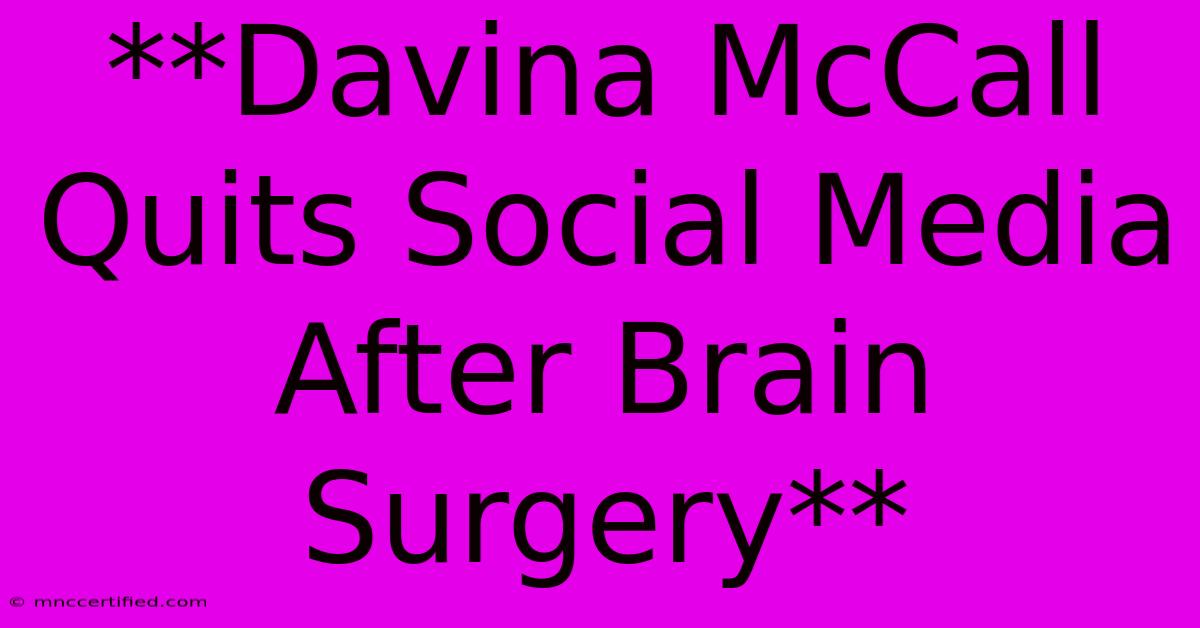**Davina McCall Quits Social Media After Brain Surgery**

Table of Contents
Davina McCall Quits Social Media After Brain Surgery: A Deeper Look
Davina McCall, the beloved British television personality, recently announced her departure from social media following brain surgery. This news sent shockwaves through her fanbase and sparked widespread concern and speculation. This article delves deeper into the situation, exploring the reasons behind her decision, the impact of social media on mental health, and the importance of prioritizing well-being.
The Announcement and its Aftermath
McCall's announcement, delivered through a heartfelt statement on her social media platforms (before subsequently leaving them), revealed her recent brain surgery and her subsequent decision to step away from the digital world. While she didn't explicitly detail the nature of the surgery, she emphasized the need for a period of rest and recovery. This candid and vulnerable approach resonated deeply with her loyal following, who offered overwhelming support and well-wishes. The news highlighted the often-hidden struggles even high-profile individuals face, reminding us that mental and physical health should always be prioritized.
Understanding the Implications of Brain Surgery
Brain surgery is a significant medical procedure, often requiring extensive recovery time. The potential physical and cognitive effects can vary widely, depending on the specific nature of the surgery. Factors like post-operative pain, fatigue, cognitive changes, and emotional upheaval are all common considerations. McCall's decision to prioritize her healing process by stepping away from social media demonstrates a responsible and proactive approach to recovery.
The Impact of Social Media on Mental Health
McCall's decision to leave social media underscores the growing awareness of its potential negative impact on mental well-being. The constant pressure to maintain an online persona, coupled with the potential for cyberbullying and negativity, can significantly affect mental health. Social media fatigue, online harassment, and the fear of missing out (FOMO) are all increasingly recognized as contributing factors to stress, anxiety, and depression. McCall's action serves as a powerful example of setting boundaries and prioritizing mental health in the face of societal pressures.
The Importance of Digital Detox
Taking a break from social media, or engaging in a digital detox, can be incredibly beneficial for mental and emotional well-being. It allows individuals to disconnect from the constant stream of information and comparisons, providing space for self-reflection and relaxation. This break can help reduce stress, improve sleep, and enhance overall mental clarity. McCall's decision highlights the potential therapeutic benefits of disconnecting from the digital world, especially during periods of recovery and convalescence.
Beyond the Headlines: Prioritizing Well-being
Davina McCall's story transcends the celebrity sphere; it's a powerful reminder of the importance of prioritizing self-care and mental well-being. Her courageous decision to step away from social media to focus on her recovery underscores the need for open conversations about mental health and the challenges of navigating the complexities of modern life. It encourages us all to reflect on our own relationship with technology and to make conscious choices that support our overall well-being.
Conclusion: Support and Respect
As fans, we should respect Davina McCall's need for privacy and space during this time. Offering support and understanding is paramount, allowing her the opportunity to fully recover and return when she feels ready. Her decision should serve as a powerful reminder that mental and physical health are paramount, and that taking breaks from the digital world can be a crucial part of self-care. We wish her a speedy and full recovery.

Thank you for visiting our website wich cover about **Davina McCall Quits Social Media After Brain Surgery**. We hope the information provided has been useful to you. Feel free to contact us if you have any questions or need further assistance. See you next time and dont miss to bookmark.
Featured Posts
-
Fintechzoom Best Crypto To Buy Now
Nov 15, 2024
-
Glastonbury 2025 Tickets Securing Your Spot
Nov 15, 2024
-
Are Silver Rounds A Good Investment
Nov 15, 2024
-
Australia Wins 1st T20 I Vs Pakistan
Nov 15, 2024
-
Halle Berry In James Bond Swimsuit
Nov 15, 2024